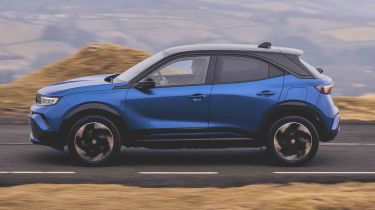Vauxhall Mokka - MPG, CO2 and running costs
With petrol, hybrid, and all-electric powertrain options, the Vauxhall Mokka offers something for lifestyle customers and business users alike

Choose any Vauxhall Mokka with a petrol combustion engine, and you’ll benefit from great fuel economy. But if you're looking for the lowest possible running costs, then the Hybrid is the one to go for. Of course, if you drive a company car or can charge at home on an off-peak electricity tariff, the Mokka Electric is worth considering, too.
Vauxhall claims the basic 128bhp petrol Mokka with its six-speed manual gearbox will return up to 49.6mpg. There's a small efficiency penalty if you opt for the automatic gearbox (46.3mpg), and when we tested this particular version of the pre-facelift Mokka, it averaged 38.6mpg. The Hybrid is likely to be the most economical petrol-powered Mokka, capable of 57.7mpg in official tests.
The CO2 levels for the petrol cars range from 110g/km to 138g/km, with Benefit-in-Kind (BiK) tax rates for company car drivers between 27 and 32 per cent.
If you’re interested in the EV, then just be aware of how the cold weather can affect efficiency. We tested the latest Mokka Electric on a cool (five to seven degrees ambient temperature, occasionally rainy) day, returning efficiency of around 3.7-3.8mi/kWh. That translates to about 190 miles of range (versus an official rating of 249 miles), or a little less if you’re sitting at a constant 70mph on the motorway. The optional £400 heat pump is a worthwhile addition, because it provides a more efficient way of heating the car up in cold weather. Ultimately, though, it’s probably best to treat the Mokka as a capable urban runaround that’s suited to an occasional long run should the need arise.
| Model | MPG | CO2 | Insurance group |
| Mokka 1.2 Turbo 136PS manual | 49.6mpg | 129g/km | 22 |
| Mokka 1.2 Turbo 130PS auto | 46.3mpg | 138g/km | 22 |
| Mokka Hybrid 1.2 136PS e-DCT6 | 57.7mpg | 110g/km | 24 |
Electric range, battery life and charge time
The Vauxhall’s 100kW peak charging speed means that while a zero to 80 per cent top-up should take just 30 minutes, it lags behind newer models such as the Kia EV3 (150kW) and forthcoming Skoda Elroq (175kW). The Mokka’s 54kWh (51kWh usable) battery will easily charge to full on a 7kW home wallbox overnight in around 7.5 hours.
| Model | Battery size | Range | Insurance group |
| Mokka Electric 54kWh 156PS | 249 miles | 0g/km | 24 |
Tax
Every new Vauxhall Mokka – even the top-spec Electric Ultimate – comes in at less than £40,000, which means no model should be subject to the luxury VED (car tax) supplement.
Insurance
Insurance premiums for the Mokka shouldn’t break the bank, with the entry-level 1.2 Turbo 128bhp sitting in group 22. The Hybrid and Electric versions fall into group 24.
If you want something with lower insurance premiums, look at the SEAT Arona, because the 1.0-litre models start in group 10, and go up to group 18.
Depreciation
According to our latest expert data, over a typical three-year/36,000-mile ownership period, the Mokka should maintain between 44-48 per cent of its original value. That’s alright, but a little disappointing when the Volkswagen T-Cross will hold onto between 47-52 per cent over the same period.
The Mokka Electric is only predicted to be worth around 33 per cent of its original value over the same period, which is very disappointing next to the Kia EV3’s 48-51 per cent.
To get an accurate valuation for a specific model, check out our valuation tool...







